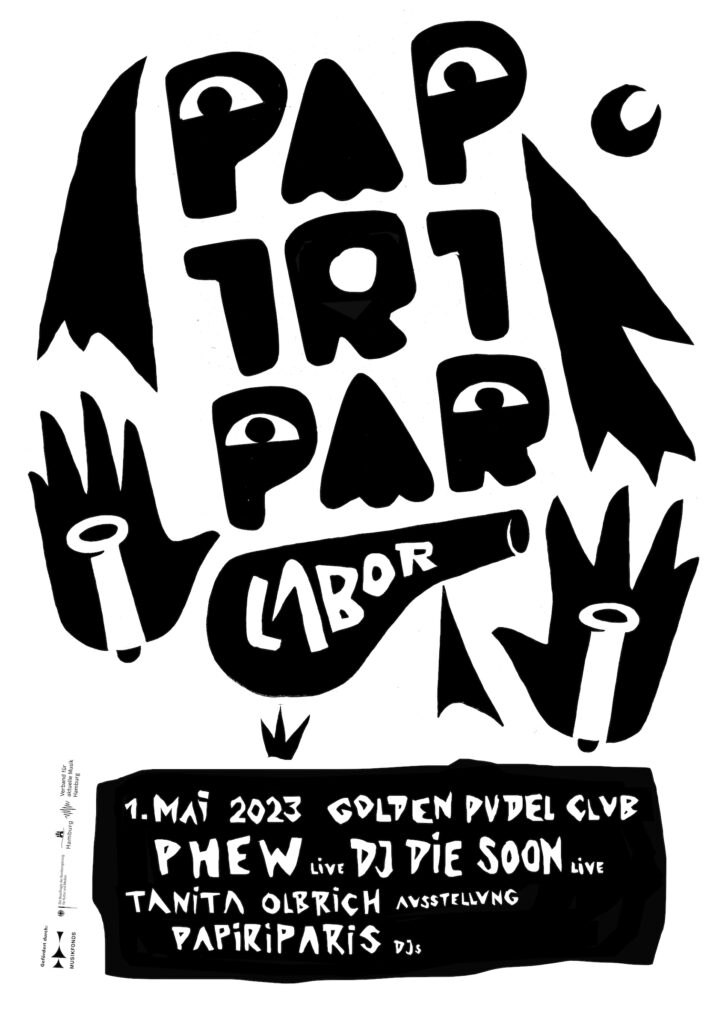Nika Son
Anticipating PAPIRIPAR festival from 18th – 21st May. . . For those who are too impatient can gather already on 1 May at the festival teaser PAPIRIPAR LABOR at Golden Pudel Club, where the Japanese no-wave legend PHEW, flanked by DJ DIE SOON and the artist Tanita Olbrich, will invoke an iridescent black sun.
PAPIRIPAR LABOR
1st May 23 / 20 h
Live/ PHEW (Mute)
In the late 1970s, Hiromi Moritani flew from Japan to Great Britain in pursuit of subcultural insight. She wanted to experience the Sex Pistols at the ground zero of their greatest veracity. Fired up by this journey, she formed the short-lived punk band Aunt Sally. After disbanding it she called herself Phew and again found herself in the right place at the right time: she recorded her first LP with musicians from CAN and DAF in Conny Plank’s studio on an old farm in the Rhineland. After this came further collaborations with the likes of Ryuichi Sakamoto and the Einstürzende Neubauten. Phew’s many tentacled globalist approach has continued to this day in her ongoing mission to forge an authentic synthesis of vocals and experimental electronic music.
Both in interviews and in her distinctive singing style, her words are plain-spoken. The intentionally half-sung lyrics serve as a thread that connects all of her works. The persistency with which over many years she has pursued her devotion to a single idea while fostering curiosity for all other ideas makes younger generations appear alarmingly unmindful of sustainability. Prior to the reissue of her aforementioned debut LP „Our Likeness„, London-based label Mute released Phew’s latest solo album „A New Decade“ in 2021. This record gathers recordings made during the past pandemic in her flat in the Tokyo suburb of Kawasaki. „Personally, I can no longer see a future that goes beyond the present,“ she said about the paradigm shift hinted at in the title. So there should be no doubt that Phew’s Hamburg performance will be another enlightning permutation of space and time!
Live/ DJ DIE SOON (Morphine)
In 1997 Daniel Dumile aka MF DOOM entered the hip hop scene in a mask inspired by the Marvel evil genius Doctor Doom. Since then, following Dumile’s initiative, increasing numbers of protagonists in this genre have also donned camouflage. Why exactly Berlin’s German rap scene took such a fancy to this cultural stunt remains a puzzle. That the Japanese musician Daisuke Imamura, who happens to live there too, has something to do with hip hop cannot be denied. Using the sampler SP-404, a stock favourite of many traditional beats producers, he compiles rhythms on which increasing numbers of international rappers have laid their verses. But his sound design is more reminiscent of European industrial music from the early 1980s and when he obscures his face as DJ DIE SOON it feels more like being beamed into a psychedelic reinvention of Japanese Noh mask theatre rather than into some US American superhero comic. He also creates an artistic universe with his drawings, which he infuses with elements of Japanese culture. His live concerts, albums, exhibitions and publications thus merge to form an original and complex total work of art recurrently fired up with shock effects.
Exhibition/ Tanita Olbrich
At it’s beginning, video art was a very costly endeavour. Early works by American artist Dan Graham, such as „Time Delay Room“ and „Present Continuous Past(s),“ both from 1974, resembled high-tech simulations of a dystopian future. In the 1990s, digital multiplexing was developed, allowing for the simultaneous recording of multiple cameras, as well as time-lapse and motion tracking. This saved time and money and led to an increased use of video surveillance. The capture of public and private spaces led to extensive social discussions, which resulted in changes in laws, especially in European countries, at the beginning of the current millennium. More recently, CCTV technology has been improved and monetized through a shift towards the „Internet of Things.“ The distinguished Berlin filmmaker Tanita Olbrich belongs to a current generation of artists who deal with contemporary issues of surveillance and pop-cultural self-documentation. With the installation of the home security camera system Ring in Hamburg’s Pudel Club for one evening, she creates a depiction of a space in which the current problems of private surveillance technologies are reflected semi-publicly.
Before, between and after
PAPIRIPARIS DJ’s
Felix Kubin, Nika Son, Fleurop
Texts: Thomas Baldischwyler
Poster: Alex Solman
